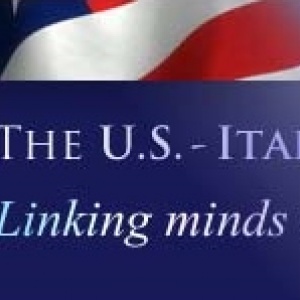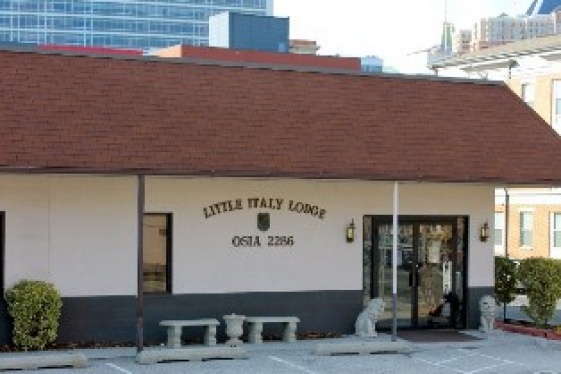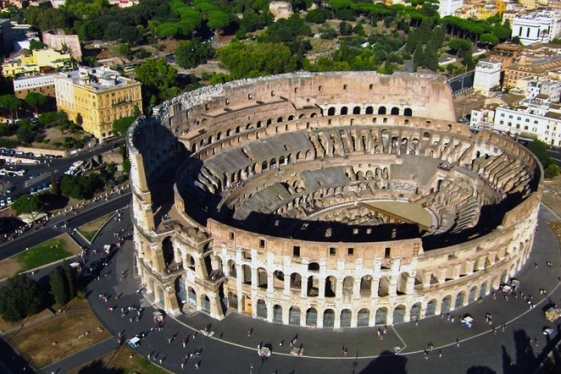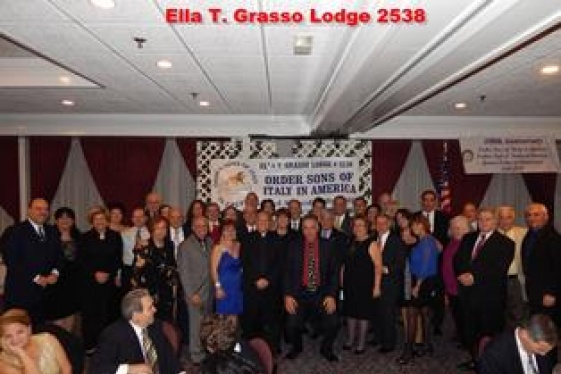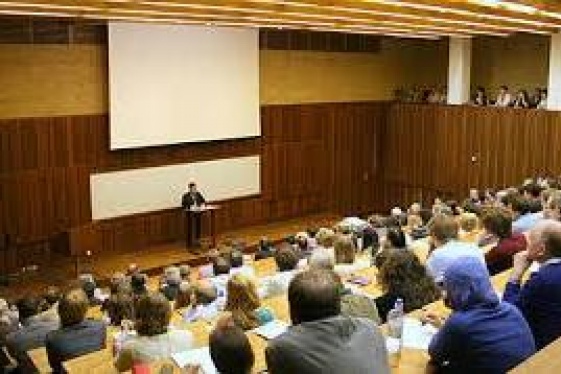
Paola Sartorio (Executive Director of the US - Italy Fulbright Commission)
La Commissione Fulbright in Italia, 70 anni di rapporti culturali tra Italia e Stati Uniti

The US - Italy Fulbright Commission is a bilateral organization, composed in equal measure by the Italian and American governments, which for decades has been linking Italy and the US, fostering cultural exchanges and helping Italians and Americans to get to know each other better, appreciating their skills and the possibility of join forces.
Paola Sartorio is the Executive Director of this wonderful organization, a real cultural bridge over the Ocean between Italy and the US.
Paola what is the Fulbright Program?
The Fulbright Program is the flagship program of the State Department. I think one of the most important reasons of the success of the Fulbright Program is that it's a bi-national program everywhere it operates. As a matter of fact, the Ministry of Foreign Affairs and International Cooperation has chosen the Commission as its tool to promote cultural exchanges opportunities with the United States. The program is co-funded by the Ministry of Foreign Affairs and the State Department.
In Italy the Program started in 1948, so this year marks the 70th anniversary of the Fulbright Program: along with 4 other countries, Italy was the first country to start the Fulbright Program, so we are very proud of carrying on this Program for so long. In these 70 years we have had some 10.000 grantees, very high figures! We will be celebrate the anniversary at the Ministry of Foreign Affairs that for the occasion has allocated additional funds that will allow us to launch new programs.
How does the US - Italy Fulbright Commission develop its activities in Italy?
We give scholarships to Italian citizens that want to study or do research in the United States for a period of time, and we give scholarships to U.S. citizens that want to come to Italy to study or do research. Representatives of the Ministry of Foreign affairs, the U.S. Embassy in Italy and several academic experts carry out selections. We follow the entire process for the Italian citizens, from publishing the announcement all the way to selecting the grantees and monitoring their stay in the US. The American grantees first apply in the United States, but the Commission selects them: so we select all of our grantees, we offer about 100 scholarships every year.
Please tell us something about Senator J. William Fulbright
Senator Fulbright was a Senator of the United States who before World War II studied in the United Kingdom, and was inspired by this experience, by the benefit and the impact that it had on his life. He was from the State of Arkansas, very different from the United Kingdom: when he went back to the United States, he wanted that other Americans would benefit of the same kind of experience.
At the end of World War II he saw an opportunity, because the United States Army was heavily present in Europe: and when they decided to go back to the States, since the War was over, they realized they didn't need all the the Army's equipment that they had. So the Army decided to sell this equipment in Europe. Senator Fulbright came up with this proposal of using the resources generated by the sale of the Army equipment to initially fund the Program. He convinced the US Government to fund it and start it, so it bears his name, and he's really seen as a pillar, a little bit like the Marshall Plane on the cultural side, of a new era.
Who are your grantees, where do they come from? And what are the most frequent academic disciplines in your exchanges?
We have two main categories: Students and Scholars. The general perception of the Fulbright Program is that we give scholarships to young students, and that's absolutely true: but we also have a very high number of scholars.
So we have students, both Italians and Americans, recent graduates, who want to study in the other country. For Italians, when they go to the States they do a master or a PhD Program. We are very happy because starting last year we are in a position of offering full cost scholarships to our Italian students. It is a two steps process: the first step is receiving a Fulbright grant; and then we have partnered with the Zegna Family, and if they agree, and this is the second level of the selection, they will fill the gap of the cost, so starting last year we are now offering full cost scholarships, everything is covered.
Then we have scholars, individuals that have already started an Academic career: they want to study or do research in the US or in Italy, and they almost always include an element of teaching. So the trickledown effect comes from the teaching experience, and it’s a sort of bridge between the host University and the home University, because the person will go back home at the end of his or her research period and continue to collaborate.
Our scholarships have the same format for both the nationalities, so they will apply to all our grantees: they come from everywhere in Italy and from everywhere in the United States, they spread out quite equally.
Our scholarships are "All Discipline": that means that the candidates indicate where they want to go and what they want to focus on, so for us the Program is open to all disciplines.
Speaking about our grantees, something I want to stress is that when we look at the statistics and data, we break some stereotypes. Italy is a very popular destination, in the Fulbright Program: in terms of number of applications to come to Italy, we are only second to the UK as a country destination. So we are operating in a strong context, because many Americans want to come to Italy.
Secondly, we have a high number of Americans that spread everywhere in Italy, so our typical grantee is no longer going only to large and more known Italian cities. In the past two years we had more American grantees in Southern Italy than anywhere else in the country, so the geography and the dynamics of where they go are completely changed.
Another stereotype we are breaking is about what they want to focus on: our statistics show that the number one discipline, for the Americans coming to Italy, is Engineering. Of course we also have humanistic and historical disciplines, we have a lot of American interested in law, public health or business: we have a very diverse group.
In addition to this program that we call "All Discipline", we also have what we call "Special Programs": in this case we have a partnership with other institutions to offer a specific scholarship. For example, we have a partnership with the Università di Pollenzo di Scienze Gastronomiche (Gastronomic Sciences) in Piedmont, where every year one or two American students enrolled in a Master program of Food Communication.
We are also proud of the sharp increase of public/private partnerships: at this point, 30% of the scholarships that we offer are generated through public/private partnerships. Our partners range from Universities to NGOs, from other Governmental Institutions to the private sector. This way we have been able to increase the number of scholarships that we give, but also to diversify our offer. We filled the gaps of certain areas where we had lower number of grantees. The most important example is the "Deafness Program": we offer a scholarship in deafness studies for the Italian students at the Gallaudet University in the US, the only University in the world that is bilingual, English and sign language, and we also have U.S. grantees of deafness studies coming to Italy. We can do this thanks to the generosity of Roberto Wirth, who is the owner of the Hassler Hotel here in Rome: he is one of the leading figures odf the deafness community in Italy and the sponsor this scholarship.
Are there many Italian American students coming to Italy with a Fulbright Scholarship?
Well, numbers vary from year to year, but I would say we have a good number of Italian Americans. The common element, for all of them, is their strong interest in learning about Italy and know the country better. Their degrees of involvement to Italy varies very much: some of them are fluent in Italian, some don't speak the language, some have never been in Italy, some have spent every summer of their life in the country, so it varies very much. I would say we have about 10 percent of Italian Americans among our American grantees.
We have a grantee this year who told us that she grew up living next to her grandma, who is Italian, and she has passed on her passion and love for Italy through the food. So now that she's grown up to the age of making her own decisions, she decided to apply for a scholarship in Italy. She has never been to the country, but she has a very strong interest.
Is there a message you'd like to send to the numerous Italian American Organizations reached by We the Italians?
I would like to encourage the Italian American organizations all over the US to let their community know about the opportunities we provide, and that the Fulbright Program offers every year a high number of scholarships to come to Italy under different programs. We have studying scholarships, but we also have teaching assistant scholarships that are very popular for young people who take a year off and come to this country to assist, as native speakers, the teachers of English in Italian public high schools. They can come from any background, they don't necessarily have to be teachers in their future career: but they can really devolve a year of their life not only to live in Italy but to be full immersed in Italian life. By teaching in Italian Public High schools they really get a full and intensive experience of what Italy is about. I would encourage the Italian American organizations in the US to let their community and their kids know that there are opportunities to come to Italy!
We work very closely with NIAF, we have collaborated with them for many years. In particular, they are our partners in the Fondazione Falcone program, they have been enthusiastic to support it: in fact, they traveled to Palermo to be at the anniversary and launch the program!
We also have another partnership with the University of Georgetown, where they will host an Italian scholar to teach and do research on education, because their interest is on the Italian Education System.
What can we suggest to our readers who, whether in Italy or America, want to apply for one of the opportunities that you promote?
We have a bilingual website, www.fulbright.it. It is divided by nationalities, so you have opportunities for Italian citizens and opportunities for US citizens: selecting your nationality is your first step, and once you have done it, you can find all your opportunities. Something I mentioned earlier but I do want to stress again are the opportunities for scholars: Fulbright opportunities are not only for students. All the information is on our website, and we also are active on social media: we have a Facebook page and a Twitter account that I would recommend following. In addition to the announcements of our scholarships, we regularly publish stories of our grantees, so you get a sense of what it's like to receive a Fulbright Scholarship.
Do you have a dynamic relationship with your Alumni?
We place great importance of our Alumni network: I would say that one of the most important contributions to the success of the Fulbright Program comes from our Alumni. Many of our partnerships that exist today are generated through them: either directly, because they get involved, or because they put us in touch with other organizations, professors, entities that then lead to new programs.
Our Alumni give an invaluable contribution in carrying out our selections and volunteer their time, and we wouldn't be able to run our business the way we do without the support of the Alumni. One of the most important elements of the Fulbright scholarships is the concept of Giving Back. This is really part of how and why we select grantees, their openness and their willingness to give back once their grants are completed: so we are very grateful to them, and we try to keep a strong network.
For example, we have just created a new program with a Fulbright Alumna, professor Margherita Ganeri: she is running a program on the Italian American diaspora and on Italian American literature at the University of Calabria. So now we have launched a program that will start in academic year 2019-2020, for an American scholar to teach a course on Italian American literature at the University of Calabria, which has become the front runner in Italy on this topic. In spring we are going to start selecting professors for this.
What if we ask you one thing that the Italian university system could "steal" from the American one, and vice versa?
This is a challenging question. I would say that what makes the Italian system strong is what in Italian we call "Approfondimento" (in-depth analysis), the strong basis that it gives to students. Our professors put a lot of emphasis into going in depth on what students study, and in fact our students are much appreciated when they go abroad, precisely because they have such a deep and thorough knowledge and background. So that's something that the US Universities might "steal" from the Italian Academic System.
About the other way around, I think I'd mention the care that the American Universities put on their students above and beyond studying, in particular the supports they give on career opportunities, in building a background that will help them in their future careers, and also in maintaining relationships as Alumni. I think that we in Italy would profit by learning from need the tutoring that American Universities do for their students.
Is there a particularly interesting event that you like to mention, among those you have organized and promoted during your term of office as Head of the Fulbright Commission in Italy?
Two years ago we launched a new initiative where every year in June we bring together in a single event here in Italy all American grantees of the current academic year and all Italian grantees of the following academic year. We started this as a sort of trial area, and it proved extremely successful. It is hosted by the Ministry of Foreign Affairs and by the US Embassy in Rome. It is a wonderful opportunity, because they are all going to be in the United States in a few months: American grantees have almost finished, the Italian ones are going to begin soon their experience, and so they start to create relationships and networks that they will use in the United States. Before this, there had never been an event when Italian and American grantees could meet. They actually enjoy it very much, they get to learn about each other's' programs and projects; and it really helped create and maintain a network, because then they stay in touch. For example, once an Italian student got up and said "I'm gonna go to Georgia Tech" and an American scholar then got up and said "I am a Professor at Georgia Tech!" It was in different disciplines, but still they had a connection. Nurturing a Fulbright community is very important for us.
Another thing I would like to remember is the one I mentioned before: two years ago, with NIAF and with Fondazione Giovanni Falcone, we started a special program in honor of judge Falcone. It's the only special program ope to both Italian and U.S. citizens. Every year one Italian student from a University in Sicily goes to the US to carry on research on the Rule of Law in very broad terms: so he can be a lawyer, but also a sociologist or an anthropologist; and an American student goes to Palermo at the Fondazione Falcone to carry on work on the same topics. For example, we had a grantee studying a juvenile rehabilitation program in the juvenile jails.
Since we launched this program, every year I have traveled to Sicily and taken part in the commemoration ceremony on May 23rd at the Aula Bunker of Palermo: that is very, very emotional event. President Mattarella attends every year.
Last year I was there with the two grantees, the Italian and the American students, for the 25th anniversary of the death of the judge Falcone. Following the aula bunker event, there is a march that starts from there and walks all the way to the Falcone tree, under his apartment. I have gone on the march with the grantees, not only with the two of the special program but other grantees joined us just for the march: we were 6 to 8 people, and to do this march with all the flags it’s very, very emotional. I am from Sicily, and this is something I care very much about.
You may be interested
-
2015 scholarship competition
The La Famiglia Scholarship committee is pleased to announce the financial aid competition...
-
Davide Gambino è il miglior "Young Italian F...
Si intitola Pietra Pesante, ed è il miglior giovane documentario italiano, a detta della N...
-
Emanuele: cervello d'Italia al Mit di Boston
Si chiama Emanuele Ceccarelli lo studente del liceo Galvani di Bologna unico italiano amme...
-
Exciting Palatine. Interview with Clementina...
You can tell she fills with excitement when she has the chance to show an important archae...
-
Italian American Culture Night
Tuesday, April 14 - 6.30 pm EDTSt. James Church Rocky Hill - 767 Elm St, Rocky Hill,...
-
Italian Americans media and beyond: between...
The Department of Italian invites you to a lecture by Fulvio S. Orsitto who is an Associat...
-
Italian Open's History and Records: A tale o...
For Italians, and Romans in particular, the Open is not just a tennis tournament where cha...












